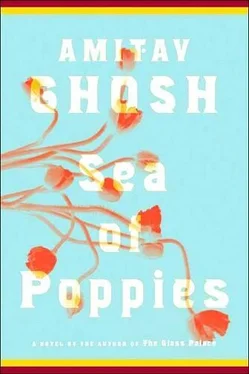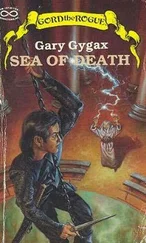+loot: 'I am persuaded that this is another word that English owes to Laskari, for this derivative of the Hind. lút probably first found employment on the Company Bawhawder'sships when applied to captured French vessels (in the sense of "prize" or "plunder").'
+lorcha: 'Whether this is a ship of Portuguese make or a Chinese copy of an European design is a vexed issue; suffice it to say that these vessels are often seen off the coast of southern China.'
luckerbaug (*The Glossary): 'Over this English word, speakers of Hind. and Bengali have been known to come to blows, the former contending that it derives from their lakkarbagga , "hyena", and the latter claiming it to be a corruption of nekrebagh , "wolf". The matter is impossible to decide for I have heard it being applied to both these creatures, and the jackal to boot.'
lugow/lagao (*The Glossary): 'A fine example of a humble word which, having "entered through the hawse-holes", as the saying goes, has now ascended to the Peerage of the Verb. In its correct Laskari usage, it is the exact nautical counterpart of "to bind" or "to fasten". Given the English lexicon's general enthusiasm for terms related to binding, tying, beating, pulling and so on, there would seem to be nothing remarkable about its steady rise through the ranks. Its passage into civilian use might well have been occasioned by the phrase " lugowinga line" (i.e., "fastening hawse", "binding a rope" etc.). This expression has gained such widespread currency that it may well be the ancestor of the verb "to lug".'
+maistry/mistri/mystery: Few words aroused Neel's passions as much as these. A recent discovery among his notes is the draft of a letter to a well-known Calcutta newspaper.
'Dear Sir: As one of the foremost English journals in the Indian subcontinent, you are rightly regarded as something of an oracle on the subject of that language. It is therefore with the greatest regret that we have noted of late, a creeping misuse of the word mistrion your pages. More than once has it been suggested that this is a Hindusthanee word that refers indifferently to plumbers, fitters, masons and repairmen. Now the truth is, sir, that the word mistrialong with its variants, maistryand mystery, are, after balti, the commonest Portuguese-derived words in the languages of India (by way of mestre ). Like baltithey may well have travelled by a nautical route, for the original meaning of maistrywas similar to its English cognate "master" (both being derived from the Latin magister ), and was probably first used in the sense of "ship's master". It is in a similar sense that the term maistryis still employed, being applied mainly to overseers, and preserving fully the connotations of authority that are implicit in its English cousin "master". It is interesting to note that in India as in Europe, the connotations of this fecund term have developed along parallel paths. Thus, just as the French maître and Italian maestro imply also the mastery of a trade or craft, so similiarly is the word mistriapplied in Hindusthanee to artisans and master-craftsmen: it is in this latter form that it is now applied to repairmen, workmen and the like. On this subject, sir, might it also be suggested that you would do well to adopt the variant spelling mystery, which possesses the great advantage of making evident the word's direct connubium with the Latin ministerium (from which we get such usages as "The Mystery Plays", so-called because they were produced by workmen who practised a mistery , or ministerium )? Would this not also deepen our sense of awe when we refer to the "Fashioner of All Things" as the "Divine Mystery"?'
This letter was never posted, but in keeping with his tenets, Neel always used the variant mystery.
+mali/malley/mauly/molley/mallee: 'The mysteriesof the garden.'
+malum: 'Some dictionaries persist in misspelling this word as malemeven though its correct form has been a part of the English language since the seventeenth century. This Laskari word for "ship's officer" or "mate" is, of course, derived from the Arabic mu'allim , "knowledgeable".'
+mandir: See sammy-house.
masalchie (*The Glossary): See bobachee.
maski: 'In no way is this curious expression connected with "musk" or "masks". In the zubbenof the South China Coast, it figures rather as something that would be described in Hind. as a takiya-kalám – that is to say, an expression that is used not for its meaning (of which it possesses none) but merely out of habit, so that it becomes, through constant repetition, as familiar and as unremarkable as a pillow or tuckier.'
+mochi/moochy: 'The mysteryof leather.'
+mootsuddy/mutsaddi: See dufter.
+munshi/moonshee: See dufter.
mura (*Roebuck): 'For a long time, I had no idea what the lascars meant when they spoke of the "jamna mura" and the "dawa mura". Only later was I to learn that this was their word for "tack", a rare borrowing from the Italian.'
+mussuck: 'Strange indeed is this name for the leather water-bag carried by bhistis, for it is but the Arabic for puckrow.'
muttranee (*The Glossary): See halalcore.
+nainsook/nayansukh: '"Pleasing to the eye" was the name of this fine cloth in Hind. The same cannot be said, however, of the English corruption of our word.'
nuddee (*the Admiral): 'This was as much a river as a nullahis a ditch, so why one should be universally used and the other not is beyond my reckoning.'
+nullah: See above.
ooloo/ullu: See gadda/gadha/gudder.
oolta-poolta / oolter-poolter (*The Glossary): 'While it is by no means incorrect to gloss this expression as having the sense of "upside down", it ought to be noted that in Laskari it was applied to a vessel that had been tipped over on her beam ends.'
paik (*The Glossary): See burkundaz.
+pani/pawnee/parny: Neel hotly disputed the notion that the Hind. word for water had entered the English language through its use in such compounds as brandy-pawneeand blatty- pawnee. This was another instance in which he gave full credence to Barrère & Leland's derivation of it from the gypsy word for water. See also bilayuti.
+parcheesi/parcheezi: Neel was outraged to find that the familiar pastime of his childhood, pachcheesi , was being packaged and sold as Ludo, Parcheesietc. 'Would that we could copyright and patent all things of value in our patrimony, before they are claimed and stolen by these greed-mongers, who think nothing of making our children pay for the innocent diversions that have been handed, even to the poorest of them, as a free bequest from the past.' No shop-bought version of this game was ever allowed to cross his threshold, and he made sure that his children played it as he had, on a square of embroidered cloth, with the brightest of Seychelles cowries.
Читать дальше












